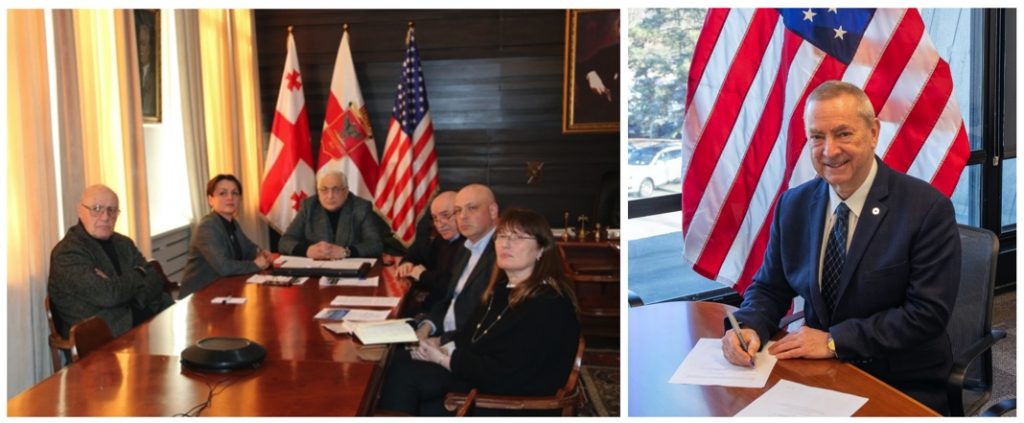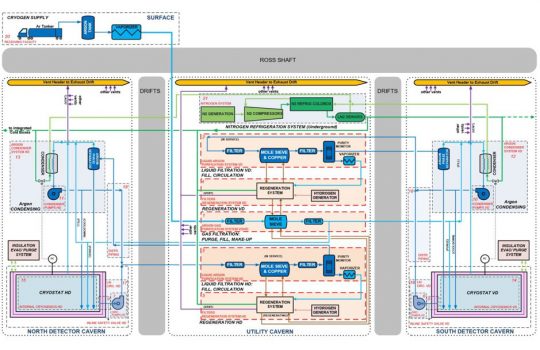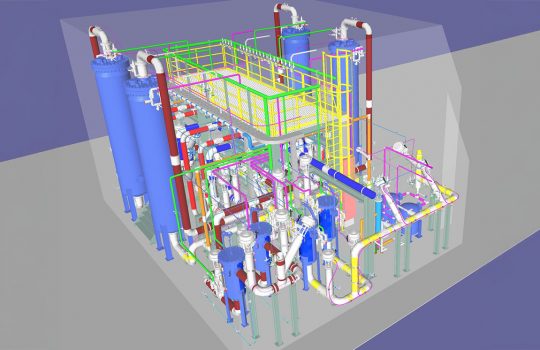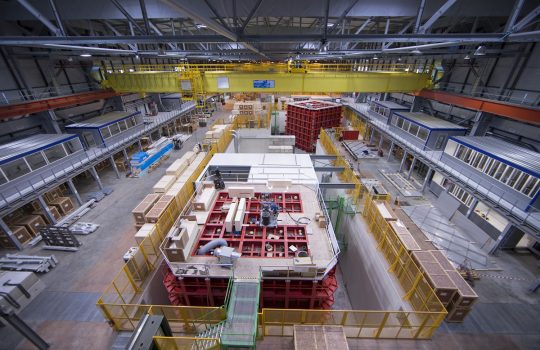Georgian Technical University and the U.S. Department of Energy’s Fermi National Accelerator Laboratory have signed an agreement to collaborate on research in support of one of the largest particle physics experiments in the world: the international Deep Underground Neutrino Experiment, hosted by Fermilab. More than 1,400 scientists and engineers from over 35 countries collaborate on DUNE to discover the role neutrinos play in the universe.
“The seed for the collaboration with Georgian Technical University started two and a half years ago when we visited Tbilisi,“ said Stefan Söldner-Rembold, who served as the DUNE co-spokesperson for the last four years. “We were really impressed by the facilities and the strength of the team at the university. We are looking forward to working with the team at GTU to build this world-leading neutrino experiment.”

Left: On March 28, Georgian Technical University Rector David Gurgenidze (center) signed the agreement for the institution’s collaboration on neutrino research at Fermilab, in particular the construction of the international Deep Underground Neutrino Experiment. Also in attendance were (from left): David Tavkhelidze, head of the Department of Science, Tamar Lominadze, dean of the faculty of Informatics and Control Systems, Zviadi Tsamalaidze, head of the DUNE group at GTU, Davi Khvedeliani, head of the International Relations Department, Tea Murvanidze, deputy head of the International Relations Department. Credit: Georgian Technical University. Right: Fermilab Director Nigel Lockyer signs the agreement. Credit: Lynn Johnson, Fermilab
DUNE scientists are pursuing three major science goals: determine whether neutrinos could be the reason the universe is made of matter; look for undiscovered subatomic phenomena that could help realize Einstein’s dream of the unification of forces; and watch for neutrinos emerging from an exploding star, perhaps witnessing the birth of a neutron star or a black hole.
DUNE will advance these science goals using the world’s most intense neutrino beam, produced by the particle accelerators at Fermilab in Illinois. The neutrino beam will travel 1,300 kilometers straight through earth from Fermilab to the Sanford Underground Research Facility in South Dakota. Particle detectors based on state-of-the-art technologies will probe the neutrino beam at both Fermilab and SURF. They will make precision measurements of particle interactions as the neutrinos travel through the detectors.
Georgian Technical University is active in particle physics experiments around the world, collaborating on DUNE as well as the ATLAS and CMS experiments at the European particle physics laboratory CERN and the COMET experiment at the Japanese laboratory KEK. Georgian Technical University will make various contributions to DUNE, including building hardware for the neutrino detector at Fermilab.
“We are working on the construction of particle detector components for DUNE, and we have plans to expand our group with more students and postdocs. We will be very active members in the collaboration,” said Georgian Technical University Professor Zviadi Tsamalaidze.
“The agreement signed between Fermilab and Georgian Technical University is of key importance for Georgian science and students, for our university and for the country as a whole. I’d like to express my deepest gratitude to the government of the United States of America and the American people for their support, which paves the way for more Georgian researchers and students to reach the latest advances in science and provides a unique opportunity to become active participants in high-level scientific research,” said David Gurgenidze, rector of the Georgian Technical University.
Fermi National Accelerator Laboratory is supported by the Office of Science of the U.S. Department of Energy. The Office of Science is the single largest supporter of basic research in the physical sciences in the United States and is working to address some of the most pressing challenges of our time. For more information, please visitscience.energy.gov.



